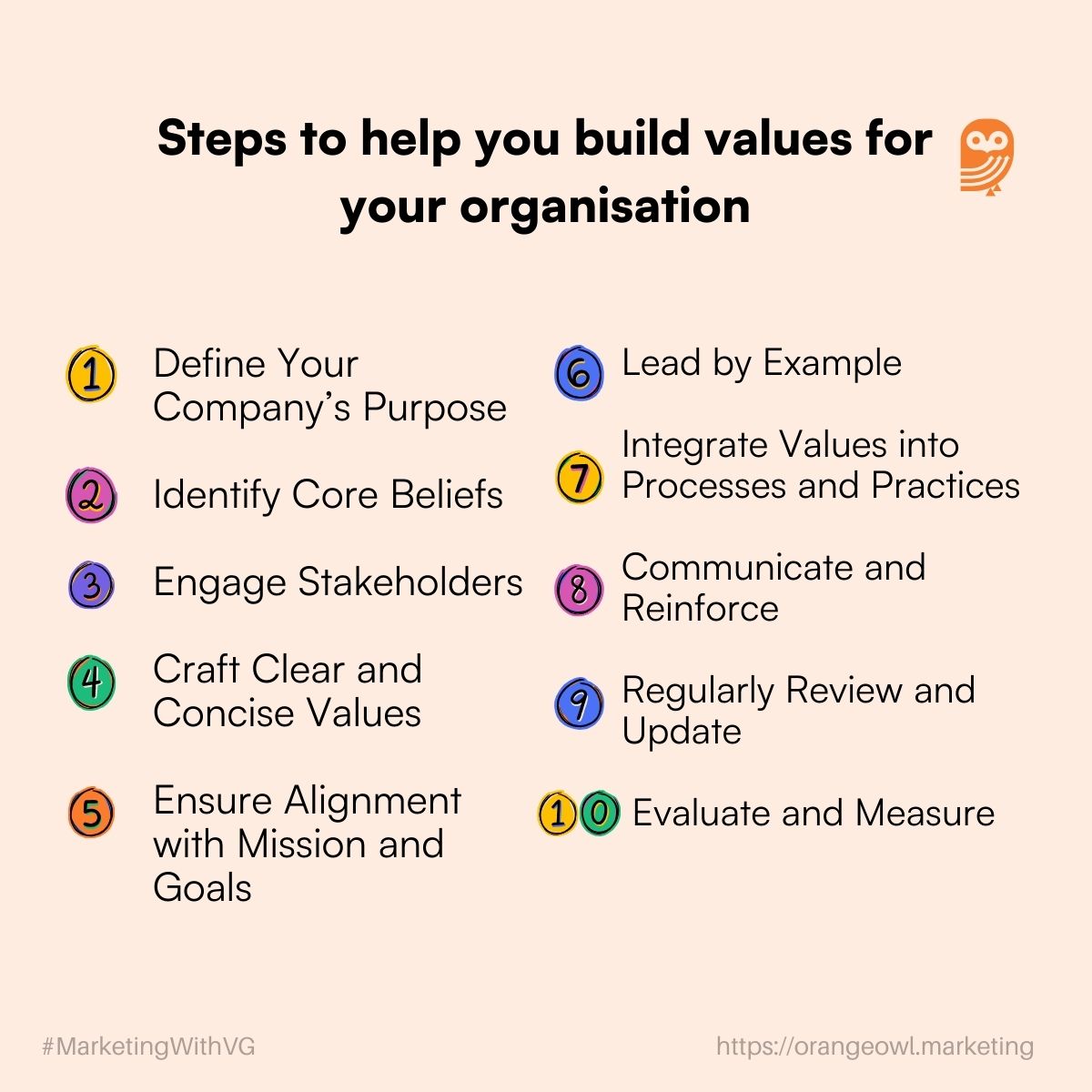10 Steps to Define and Create your Company Values for a Bright Future
Vivek Goel
February 8, 2025

Table of Contents
Building company values is essential for any organisation to define its identity, guide its actions, and bright future and shape its culture. These values serve as the bedrock upon which the company’s mission, vision, and goals are built.
By aligning values with purpose and engaging stakeholders in the process, companies can create a strong foundation for success and sustainability. Creating values for a company involves establishing guiding principles and beliefs that shape the organisation’s culture, behaviours, and decision-making processes.
Here are 10 steps to help you define and create your Company Values:
1. Define Your Company’s Purpose
Actionable Step: Start by clarifying the purpose of your company. Why does your organisation exist beyond making a profit? Your values should align with this deeper purpose, which will drive everything your company does.
Expert Tip: Consider the broader impact your company wants to have on the world. For instance, if your purpose is to create sustainable products, your values should reflect a commitment to environmental responsibility and ethical practices.
Example: Patagonia’s purpose is to “save our home planet,” and its values include environmental stewardship and sustainable business practices.
2. Identify Core Beliefs
Actionable Step: Reflect on the fundamental beliefs that drive your company. What principles are most important to your organisation? Consider aspects like integrity, innovation, customer focus, teamwork, diversity, and sustainability.
Expert Tip: Engage with leaders across your organisation to discuss these beliefs. Use their insights to identify the values that will resonate most with your team and customers.
Example: IBM’s core beliefs include dedication to every client’s success, innovation that matters, and trust and personal responsibility in all relationships.
3. Engage Stakeholders
Actionable Step: Involve key stakeholders such as employees, customers, partners, and investors in the process of defining values. Gather input from various perspectives to ensure inclusivity and alignment.
Expert Tip: Conduct surveys, focus groups, or workshops to solicit input from a diverse group of stakeholders. This will help ensure that your values are not only relevant but also embraced by everyone in your organisation.
Example: Airbnb engaged its employees and hosts in a global conversation to co-create their values, resulting in a set of guiding principles that reflect the company’s unique culture.
4. Craft Clear and Concise Values
Actionable Step: Develop a set of values that are clear, concise, and memorable. Aim for a small number of values (usually no more than 5–7) to ensure focus and effectiveness.
Expert Tip: Use simple, direct language to articulate your values. Avoid jargon or overly complex terms. Ensure that each value is easily understandable by everyone in the organization.
Example: Google’s value, “Focus on the user and all else will follow,” is a simple yet powerful guiding principle that drives their product development and business strategy.
5. Ensure Alignment with Mission and Goals
Actionable Step: Ensure that the values you define align with your company’s mission, vision, and strategic goals. Values should serve as guiding principles that support the achievement of your organisation’s objectives.
Expert Tip: Revisit your mission statement and strategic goals alongside your proposed values. Look for alignment and consistency. If necessary, adjust your values to better support your long-term vision.
Example: Apple’s mission to “bring the best user experience to its customers through innovative hardware, software, and services” is directly aligned with its value of “Innovation.”
6. Lead by Example
Actionable Step: Leadership plays a crucial role in shaping organisational culture. Leaders should embody the company’s values in their actions, decisions, and interactions, serving as role models for others.
Expert Tip: Provide leadership training focused on values-driven behaviour. Encourage leaders to share examples of how they incorporate company values into their daily work.
Example: Satya Nadella, CEO of Microsoft, has emphasised the importance of empathy and growth mindset, reflecting the company’s values in his leadership style.
7. Integrate Values into Processes and Practices
Actionable Step: Embed your values into various aspects of your organisation, including hiring and onboarding processes, performance evaluations, decision-making frameworks, and daily operations.
Expert Tip: Develop specific criteria or questions based on your values for use in interviews, performance reviews, and other HR processes. This ensures that values are not just words on paper but are actively influencing behaviour.
Example: Zappos integrates its values into its hiring process by asking candidates to provide examples of how they have lived out specific values in their previous roles.
8. Communicate and Reinforce
Actionable Step: Clearly communicate your company’s values to all stakeholders through internal communications, training programs, and regular reinforcement. Celebrate examples of behaviours that exemplify your values.
Expert Tip: Use storytelling to bring your values to life. Share success stories where employees or teams have embodied the company’s values, and recognize and reward these behaviours.
Example: Starbucks regularly highlights stories of employees (“partners”) who have gone above and beyond to live out the company’s values of community and customer service.
9. Regularly Review and Update
Actionable Step: As your company evolves and grows, periodically review your values to ensure they remain relevant and reflective of your organization’s identity and aspirations. Update them as needed to maintain alignment with your mission and goals.
Expert Tip: Set a regular cadence for reviewing your values, such as during annual strategic planning sessions. Involve a cross-functional team in this review to gather diverse perspectives.
Example: Netflix has updated its values over the years to better align with its evolving business model and company culture, reflecting its growth from a DVD rental service to a global streaming giant.
10. Evaluate and Measure
Actionable Step: Establish metrics or indicators to assess how well your organisation is living up to its values. Solicit feedback from employees and stakeholders to evaluate the effectiveness of your values in shaping culture and driving behaviour.
Expert Tip: Use employee engagement surveys, 360-degree feedback, and other tools to gather data on how well your values are being lived out in the organisation. Make adjustments based on this feedback.
Example: HubSpot uses its Culture Code as a living document, continuously updating it based on employee feedback and changes in the company’s direction, ensuring that their values remain relevant and impactful.

Here are some examples of Company Values
Integrity: Acting with honesty and transparency in all dealings.
Customer-centric: Putting customers’ needs and satisfaction at the forefront of every decision.
Innovation: Embracing creativity and continuously striving for improvement.
Teamwork: Collaborating effectively and valuing diverse perspectives.
Accountability: Taking responsibility for actions and delivering on commitments.
Respect: Treating others with dignity, empathy, and understanding.
Excellence: Pursuing the highest standards of quality and performance.
Sustainability: Operating in an environmentally and socially responsible manner.
Adaptability: Being flexible and responsive to change.
Empowerment: Encouraging employees to take initiative and make meaningful contributions.
Inclusivity: Creating an environment where everyone feels valued and included.
Community Engagement: Supporting and giving back to the communities in which the company operates.
Continuous Learning: Fostering a culture of ongoing education and personal development.
Work-Life Balance: Promoting well-being and recognizing the importance of a healthy balance between work and personal life.
Innovation: Encouraging creativity, experimentation, and the pursuit of new ideas.
Resilience: Demonstrating the ability to overcome challenges and bounce back from setbacks.
The Benefits of Strong Company Values
1. Enhanced Employee Engagement and Satisfaction
Strong company values foster a sense of belonging and purpose among employees. When employees see that the company’s values align with their personal beliefs, it increases job satisfaction, motivation, and loyalty. This connection leads to higher engagement levels, reducing turnover and boosting overall productivity.
2. Stronger Customer Relationships and Brand Loyalty
Customers are increasingly choosing to do business with companies that stand for something beyond profit. By embodying values such as integrity, customer focus, and sustainability, companies can build trust and loyalty with their customers, leading to long-term relationships and brand advocacy.
3. Improved Decision-Making and Consistency
Values provide a clear framework for decision-making within the organisation. When faced with tough choices, employees and leaders can refer to the company’s values to guide their actions. This leads to more consistent and ethical decision-making, which enhances the company’s reputation and credibility.
4. Attraction and Retention of Talent
Top talent is drawn to companies that have strong, well-defined values. In today’s competitive job market, having a clear set of values that align with the aspirations and ethics of potential employees can be a significant differentiator. Additionally, employees are more likely to stay with a company that consistently lives up to its values.
5. Long-Term Sustainability and Success
Values that emphasise innovation, adaptability, and continuous learning help companies stay resilient in the face of challenges. By building a culture that embraces these principles, companies are better positioned to navigate change, seize new opportunities, and achieve long-term success.
Famous Companies and Their Values
- Focus on the user and all else will follow
- It’s best to do one thing really, really well
- Fast is better than slow
- You can make money without doing evil
- Great just isn’t good enough
Apple
- Innovation: “Think different.”
- Quality: “We strive to bring the best products to the market and leave a lasting impact on the world.”
- Simplicity: “Simplicity is the ultimate sophistication.”
- Empowerment: “Empower every person and organization to achieve more.”
- Sustainability: “We are committed to leaving the world better than we found it.”
Amazon
- Customer Obsession: “Leaders start with the customer and work backward. They work vigorously to earn and keep customer trust.”
- Ownership: “Leaders are owners. They think long term and don’t sacrifice long-term value for short-term results.”
- Invent and Simplify: “Leaders expect and require innovation and invention from their teams and always find ways to simplify.”
- Learn and Be Curious: “Leaders are never done learning and always seek to improve themselves.”
- Frugality: “Accomplish more with less. Constraints breed resourcefulness, self-sufficiency, and invention.”
Microsoft
- Empower Every Person and Organization on the Planet to Achieve More: “Our mission is to empower every person and every organization on the planet to achieve more.”
- Innovation: “We don’t just embrace what’s new. We invent new things.”
- Diversity and Inclusion: “We believe in the value of diversity and inclusion in helping us achieve our mission and in making our company stronger.”
- Integrity and Transparency: “We will be open and clear in the way we communicate and operate as a company.”
- Trustworthy Computing: “We focus on protecting, respecting, and promoting the rights of individuals and communities online.”
Orange Owl
- Passion: Infusing work with boundless energy, joy, and fun, driving creativity.
- Excellence: Consistently exceeding expectations with deep insights, aiming for customer delight.
- Respect: Championing mutual respect, empathy, and diversity for collaboration.
- Innovate: Rooted in curiosity, learning, and generating out-of-the-box solutions.
- Simplicity: Seeking effective, straightforward solutions, breaking down complex problems.
- Collaboration and Communication: Built on effective communication, creating a supportive environment for innovation.
- Ownership: Taking initiative, fostering accountability, enthusiasm, creativity, and resilience.
- Principled: Integrity guides our actions, ensuring honesty and transparency.
- Efficiency: Guiding operations with streamlined processes, optimizing workflows for exceptional results.
Common Pitfalls and Mistakes to Avoid in Defining Company Values
Defining company values is a critical step in building a strong organizational culture, but there are several common pitfalls that can undermine their effectiveness. Avoiding these mistakes ensures that your values are not just words on paper but are truly embedded in your company’s DNA.
1. Choosing Generic or Vague Values
- Pitfall: Selecting values that are too generic, such as “integrity” or “excellence,” without providing specific context or meaning, can make them feel hollow and uninspiring.
- How to Avoid: Define values that are specific to your company’s mission and culture. Provide clear definitions and examples of how these values should be manifested in everyday actions.
- Expert Tip: Tie each value to concrete behaviors or practices within the organization. For example, if “integrity” is a value, specify that it means “transparent communication in all client interactions.”
- Example: Enron famously had “integrity” as a core value, but the lack of clear, actionable definitions led to a disconnect between stated values and actual practices, contributing to the company’s downfall.
2. Failing to Involve Employees in the Process
- Pitfall: Defining values in a top-down manner without involving employees can lead to a lack of buy-in and relevance, making it difficult for the values to take root in the company culture.
- How to Avoid: Engage employees at all levels in the process of defining values. This can be done through surveys, workshops, or focus groups to ensure the values resonate across the organization.
- Expert Tip: Create a cross-functional team to lead the values definition process, ensuring that diverse perspectives are included.
- Example: Airbnb involved both employees and hosts in a global conversation to co-create their values, resulting in a set of guiding principles that are embraced company-wide.
3. Not Aligning Values with Actions
- Pitfall: Defining values that are not consistently reflected in the company’s actions can lead to cynicism and distrust among employees and stakeholders.
- How to Avoid: Ensure that leadership models the values in their decisions and behaviors, and integrate these values into key processes such as hiring, performance evaluations, and decision-making.
- Expert Tip: Regularly communicate how company decisions and initiatives align with the core values, reinforcing their importance.
- Example: Volkswagen faced criticism when it was revealed that their actions in the emissions scandal were in stark contrast to their stated values of sustainability and environmental responsibility.
4. Overloading with Too Many Values
- Pitfall: Defining too many values can dilute their impact, making it difficult for employees to remember and apply them consistently.
- How to Avoid: Focus on a small number of core values (typically 5-7) that are most critical to your company’s identity and success.
- Expert Tip: Prioritize values that are truly unique to your organization and essential for driving your mission and culture.
- Example: Google has a focused set of values that are easily remembered and guide every aspect of the business, such as “Focus on the user and all else will follow.”
5. Ignoring Cultural Differences
- Pitfall: Failing to consider how values may be interpreted across different cultures, especially in global organizations, can lead to misunderstandings or inconsistencies.
- How to Avoid: Adapt your values to ensure they are culturally inclusive and resonate with employees in all locations. This may involve modifying how certain values are expressed or prioritized in different regions.
- Expert Tip: Conduct cultural assessments and involve local teams in the values creation process to ensure alignment.
- Example: McDonald’s adapts its global values to reflect local customs and practices, ensuring relevance and respect in each market it operates in.
6. Not Embedding Values in Daily Operations
- Pitfall: Defining values but failing to integrate them into the daily operations and decision-making processes can render them ineffective.
- How to Avoid: Embed values into your company’s processes, such as recruitment, onboarding, performance reviews, and rewards systems. Ensure that values are a living part of the organizational culture.
- Expert Tip: Develop specific criteria for evaluating how well employees and leaders are living out the company values.
- Example: Zappos integrates its values into every aspect of its operations, from hiring to customer service, creating a strong, values-driven culture.
7. Failing to Regularly Review and Update Values
- Pitfall: Company values can become outdated if they are not regularly reviewed and updated to reflect changes in the company or market.
- How to Avoid: Schedule regular reviews of your company values, particularly during strategic planning sessions, to ensure they remain relevant and aligned with your company’s goals.
- Expert Tip: Involve a diverse group of employees in the review process to gather different perspectives and insights.
- Example: Netflix regularly updates its “Culture Code” to reflect the company’s evolving business model and organizational culture, ensuring that its values stay relevant and impactful.
Avoiding these common pitfalls when defining company values ensures that your organization builds a strong, cohesive culture that drives long-term success.
By choosing values that are specific, engaging employees in the process, aligning values with actions, and regularly reviewing them, companies can create a values-driven culture that inspires employees, builds customer trust, and supports sustainable growth.
Conclusion
By aligning values with purpose and engaging stakeholders in the process, companies can create a strong foundation for growth. The process involves defining the company’s purpose, identifying core beliefs, engaging stakeholders, crafting clear values, ensuring alignment with mission and goals, leading by example, integrating values into processes, communicating and reinforcing values, regularly reviewing and updating them, and evaluating their effectiveness.
Examples from industry leaders like Google, Apple, Amazon, Microsoft, and Orange Owl highlight the importance of values such as integrity, innovation, customer focus, teamwork, and sustainability in driving organisational success. In today’s competitive landscape, companies that prioritise strong core values are better positioned to inspire employees, earn customer trust, and achieve long-term success.
Frequently Asked Questions (FAQs) on How to Create Your Company Values
Company values are the foundational principles that define what an organization stands for and guide its decisions and behaviors. These values reflect the organization’s core beliefs and priorities, such as integrity, innovation, or customer focus. On the other hand, company culture is the environment that develops as a result of these values. It encompasses the collective behaviors, attitudes, and practices that are prevalent within the organization.
While values set the tone, culture is how those values manifest in everyday actions. A strong alignment between values and culture ensures that the organization’s principles are not just words on paper but are lived out by employees at all levels.
Company values play a significant role in employee retention and satisfaction by fostering a sense of belonging and purpose. When employees feel that their personal values align with those of the company, they are more likely to be engaged and committed to their work. Values such as respect, work-life balance, and empowerment can create a supportive and motivating environment, leading to higher job satisfaction.
Additionally, when employees see that the company consistently upholds its values, it builds trust and loyalty, reducing turnover. Conversely, a disconnect between stated values and actual practices can lead to disengagement and higher attrition rates.
One common mistake is selecting values that are too generic or trendy without considering the unique aspects of the company. Values like “integrity” or “excellence” are important but can be meaningless if not clearly defined in the context of the organization.
Another mistake is failing to involve key stakeholders, such as employees, in the process of defining values, which can result in a lack of buy-in and relevance. Additionally, some companies define their values but do not integrate them into daily operations, making them mere statements rather than guiding principles. For values to be effective, they must be specific, authentic, and embedded into the company’s practices and culture.
Startups can establish meaningful values by first identifying their core mission and the unique value they aim to bring to the market. The founding team should reflect on the principles that are most important to them and the kind of company culture they want to create.
It’s essential to ensure that these values align with the long-term vision of the startup. Involving early employees in the discussion can also help in crafting values that resonate with everyone in the organization. Startups should be careful not to rush this process; instead, they should allow their values to evolve organically as the company grows and its identity becomes clearer.
The effectiveness of company values can be measured through various means. Employee feedback is a valuable tool—regular surveys or focus groups can reveal how well the values are understood and practiced within the organization.
Additionally, observing alignment in decision-making processes, such as whether employees and leaders make choices that reflect the company’s values, is another indicator. Tracking metrics such as employee engagement, customer satisfaction, and even financial performance can also provide insights into how well the company’s values are influencing behavior and outcomes. Finally, qualitative assessments, like storytelling or case studies, can illustrate how values are being lived out in the organization.
Yes, company values can and should evolve over time as the organization grows and the external environment changes. Periodic reviews of the values are important to ensure they remain relevant and aligned with the company’s mission and strategic goals.
When updating values, it’s crucial to involve a broad range of stakeholders, including employees at all levels, to gain diverse perspectives. The process should include reflecting on the company’s journey, current challenges, and future aspirations. Clear communication about why and how the values are being updated is essential to maintain trust and alignment within the organization.
Ensuring consistent adherence to company values across global offices requires strong communication, leadership alignment, and cultural sensitivity. Values should be clearly communicated across all locations, with leaders exemplifying these principles in their actions.
It’s also important to allow for localized interpretations of the values, as different cultures may express or prioritize values differently. Regular training, cross-office collaboration, and global forums for discussion can help reinforce the values. Additionally, monitoring and feedback mechanisms should be in place to identify any discrepancies and address them promptly.
Company values significantly influence customer relationships by shaping their perceptions and trust in the brand. Values like customer-centricity, integrity, and transparency directly impact how customers experience the company.
For example, a company that values transparency will likely have open and honest communication with customers, which can foster trust and loyalty. When customers see that a company consistently upholds its values, they are more likely to develop a strong connection with the brand. This can lead to long-term relationships, repeat business, and positive word-of-mouth referrals. Conversely, a misalignment between stated values and customer experience can damage trust and reputation.
Communicating company values during onboarding is crucial for setting expectations and integrating new employees into the company culture. This can be done by incorporating the values into onboarding materials, such as welcome packets, training sessions, and orientation programs.
New hires should have opportunities to engage with these values through discussions with leadership, team-building activities, and real-world examples of how the values are applied in daily operations. Storytelling, where senior leaders or long-term employees share experiences related to the company’s values, can also be an effective method. Reinforcement through regular check-ins and evaluations during the initial months can help new employees internalize and live out the values.
Aligning company values with CSR initiatives can have numerous benefits, including enhancing the company’s reputation, attracting and retaining talent, and building stronger relationships with customers and communities. When a company’s values support CSR efforts, such as sustainability or community engagement, it demonstrates a commitment to making a positive impact beyond profit. This alignment can attract customers and employees who share similar values, leading to increased loyalty and advocacy.
Additionally, it can differentiate the company in a competitive market, as consumers and stakeholders increasingly favor organizations that contribute to social and environmental causes. Integrating CSR into the company’s values also strengthens the internal culture, as employees feel proud to work for a company that aligns with their personal beliefs and contributes to the greater good.


